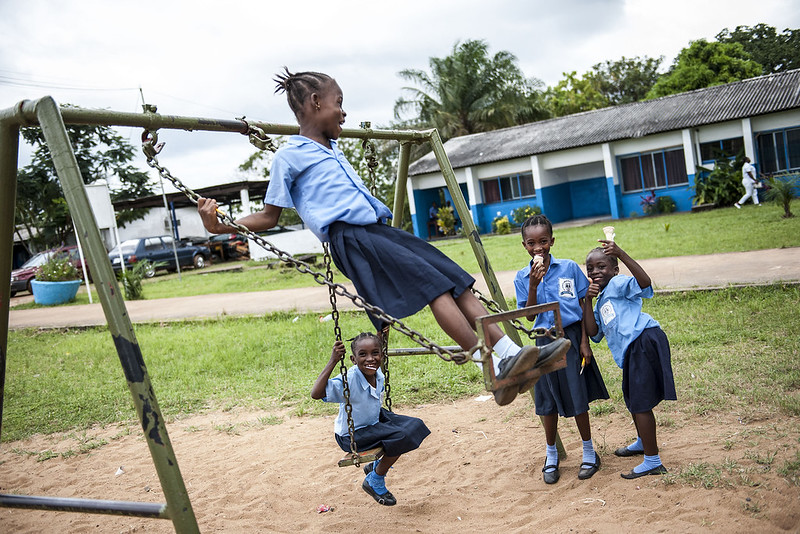Education, Poverty and UBIs in Liberia

Universal Basic Income (UBI) is a stipend provided to individuals irrespective of their employment status. It aims to bolster the economy across various demographics and sparks contentious debates. A central inquiry revolves around UBI’s long-term economic stimulation, with education emerging as a critical solution. Education and poverty are intricately intertwined. According to Montgomery County, “In general, average achievement scores decrease as the duration of poverty impact increases.” As academic performance declines, the prospects for a high quality of life also diminish. United Nations Educational, Scientific and Cultural Organization (UNESCO) highlights that proficient reading skills alone have the potential to uplift hundreds of millions of individuals living in poverty from their current circumstances. Education serves as a pathway out of poverty. The debate surrounding UBI has persisted for a significant period, with arguments presented by both proponents and opponents. Each side offers compelling reasons to support or oppose UBI initiatives. Nevertheless, GiveDirectly presents persuasive evidence that UBIs are effective, showcasing their ability to reduce poverty in Liberia significantly.
Some Information: How UBIs Lower Poverty in Liberia
UBIs are easy to understand. They are an amount of money distributed to individuals in a society suffering extreme poverty. Poverty in Liberia falls within this guideline. Over half of the country’s population struggles to survive on less than $2 daily.
UBIs do not discriminate based on employment, age or health concerns. GiveDirectly allocates them to an entire demographic of people. They are “Universal.” The idea is that providing a baseline for an economy on which to grow will bolster that economy enough to jumpstart productivity and ensure long-term growth. GiveDirectly’s UBI also allocates more considerable sums instead of dividing them into small payments over time. Even their name suggests their goal. To “Give Directly” the support people need.
GiveDirectly: The Data
GiveDirectly is an organization fighting poverty in Liberia and other places around the globe. Since 2009, GiveDirectly has afforded more than $700 million to impoverished people. It has had initiatives to fight poverty in Liberia and years of meticulous research to back up its efforts.
The Borgen Project consulted Yonah Lieberman, GiveDirectly’s Senior Manager of Communications and Press, to gain insight into how Liberians utilized their monetary allocations. Lieberman responded by presenting a comprehensive breakdown, allowing the figures to speak for themselves.
33% of the funds went to education, 20% for food expenses, 14% for constructing new houses and 9% for home upgrades or structural improvements. Recipients set aside 8% of the funds for purchasing clothes and furnishings to improve comfort and quality of life. The remaining 4% of the funds were invested in agriculture, covering expenses related to seeds and fertilizers. GiveDirectly’s website provides extensive information about research methods and the outcomes of its UBI initiative.
Poverty in Liberia: Education
The numbers were impressive and the first item on Lieberman’s list encouraged the data further, i.e., education. Knowledge is power, an old maxim but a tried and true one. Many of the fears surrounding UBI stem from its longevity and sustainability. Naysayers argue that UBIs in Liberia are short-term fixes, bandaids on a wound that needs direct treatment. Nevertheless, the data from GiveDirectly combats that argument.
Education is among the highest concerns and a statistic continually linked to poverty. Wherever one reads tables and graphs measuring poverty, one also comes across that region’s deficit in educational resources. When it comes to poverty in Liberia, the case is no different. Education contributes more than 25% of the factors governing the country’s overall Multidimensional Poverty Index (MPI). In layperson’s terms, this means that a significant portion of the general reasons poverty in Liberia rates so high is because of Liberian’s lack of educational resources.
The Good News
On GiveDirectly’s webpage, visitors can discover numerous personal accounts detailing the impact of the organization’s support on education. Jennifer shares her experience of being able to cover her children’s school fees after receiving an initial sum of $111. Sarah recounts how she used $150 to settle school fee debts for her children from previous terms and enable her daughter to obtain certificates, paving the way for her college education. Meanwhile, Masha shares her journey of enrolling in college as a part-time student to pursue a course in masonry.
These stories are regularly updated and showcased in a dynamic feed on GiveDirectly’s website, offering real-time insights into the progress made by individuals. Visitors are encouraged to revisit the site for ongoing updates on GiveDirectly’s UBI initiative and its significant impact on poverty alleviation in Liberia throughout the year.
– Antonio Muhs
Photo: Flickr
